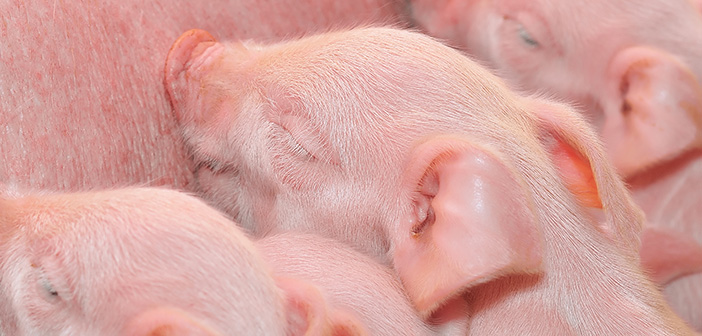New research, commissioned by ABN, raises the potential to offer improved piglet welfare and significantly increased productivity from dietary changes for hyper-prolific sows.
Pig breeding companies have been successfully selecting for increased sow prolificacy for many years, with litter size increasing by approximately 0.3 piglets per sow, per year over the last 10 years alone.
While this remarkable improvement contributes significantly to the profitability of the pig industry, an increase in litter size has inevitably brought with it an increase in vulnerable piglets, with a subsequent reduced chance of survival.
ABN has devoted a major part of its research effort into increasing survival chances, particularly of the smaller piglet, by investigating the effect of maternal nutrition and identifying specific risk factors associated with reduced piglet survival.
“Increasing litter size can mean an increase in litter weaned weight but is often associated with a reduction in average piglet weaned weight,” said Dr Steve Jagger, senior pig nutritionist at ABN.
“Similarly, a larger litter is also associated with a greater variation in piglet birth weight and hence an increased number of small piglets.”
It has long been established that in general smaller piglets at birth have a lower chance of survival, especially if they are less than 1kg live weight. This is mainly due to the lower energy reserves of the smaller piglet and the difficulty in controlling body temperature.
“The intake of sufficient colostrum is vital for optimum piglet health and growth. It has been established that a piglet should consume at least 200g of colostrum to significantly reduce mortality,” said Dr Jagger.
“However, the quantity of colostrum produced by hyperprolific sows is thought not to increase as litter size increases, therefore the quantity available for each piglet is reduced.”
To further understand how maternal nutrition may affect piglet survival, ABN commissioned a PhD at the University of Leeds, conducted by Dr Hannah Davis and overseen by Professor Helen Miller, over a period of four years.
Published in the journal of Animal Feed Science and Technology, the work evaluated concepts that may improve survival chances, including determining antibody and colostrum yield, and assessing piglet performance.
A total of 279 multiparous sows were used across four experiments, receiving either a control or an experimental diet.
The work found a significant increase in colostrum and immunoglobulin yield. An increase in colostrum intake has been shown to increase weaned weight, and the effect is proportionally greater with piglets of smaller birth weight.
Each trial at the University of Leeds showed the treatment group associated with an increase in colostrum production consistently increased piglet weight, both at 24 hours after birth, and at weaning.
Dietary changes increased colostrum by as much as 28% and increased the concentration of immunoglobulins by almost 10% leading to increased colostrum and immunoglobulin intake by the piglets.
Technical expert Paul Toplis said: “These results confirm the literature where an improvement in colostrum intake has increased piglet weight through to weaning. The research breaks new ground and confirms ABN’s determination to follow through on this considerable promise, by focusing research and development in this area.,
“If we can improve survival by as little as 1%, that means an extra 125 pigs weaned per year from a 500-sow unit, or an extra 100,000 pigs weaned per year in GB alone.”


